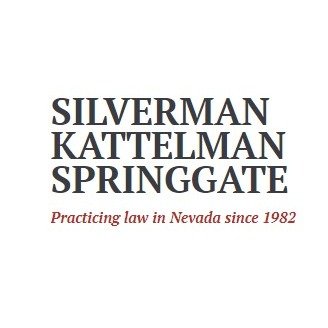Best Financial Services Regulation Lawyers in Nevada
Share your needs with us, get contacted by law firms.
Free. Takes 2 min.
Or refine your search by selecting a city:
List of the best lawyers in Nevada, United States
About Financial Services Regulation Law in Nevada, United States
Financial Services Regulation in Nevada encompasses the laws, rules, and standards that govern the conduct of banks, credit unions, payday lenders, mortgage companies, investment advisors, and other financial service providers operating in the state. These regulations are designed to protect consumers, promote the safety and soundness of financial institutions, and ensure fair and ethical practices in the financial industry. Nevada’s financial regulatory framework aligns with federal regulations while also addressing state-specific concerns, such as licensing, consumer complaints, anti-money laundering requirements, and interest rate limitations.
Why You May Need a Lawyer
Individuals and businesses may need a lawyer with expertise in Nevada’s financial services regulation for a variety of reasons. Common situations include:
- Licensing and registration of a new financial services business, such as a payday lender or mortgage broker
- Ensuring compliance with state and federal regulations and responding to changes in the law
- Defending against enforcement actions by the Nevada Financial Institutions Division or federal agencies
- Responding to investigations or audits by regulatory authorities
- Addressing consumer protection disputes or allegations of unfair or deceptive practices
- Negotiating and drafting contracts or disclosure documents for clients or business partners
- Resolving disputes arising from loan agreements or investment products
- Assistance in reporting and mitigating cybersecurity breaches and data privacy incidents
- Guidance on anti-money laundering and financial crime prevention requirements
- Assisting consumers who believe they have been victims of financial fraud or abuse
Local Laws Overview
Nevada’s financial services regulation is governed by both state and federal laws, but there are several key state-specific aspects to be aware of:
- Licensing Requirements: Most financial service businesses operating in Nevada must be licensed by the Nevada Financial Institutions Division, including mortgage companies, collection agencies, payday lenders (high-interest lenders), and money transmitters.
- Payday Lending Rules: Nevada law caps certain fees, mandates clear loan disclosures, and restricts the number of outstanding loans a borrower can have. High-interest loans are heavily regulated to prevent predatory lending.
- Interest Rate Caps: There are specific regulations on permissible interest rates for consumer loans, especially those offered by high-interest lenders, to protect consumers from excessive charges.
- Consumer Protections: State laws mandate clear disclosures, prohibit unfair or deceptive practices, and provide procedures for filing consumer complaints against financial service providers.
- Data Privacy: Nevada has enacted laws regarding financial data privacy and cybersecurity measures, including requirements for notifying individuals in case of a data breach involving personal information.
- Securities and Investments: The Nevada Securities Division regulates the offer and sale of securities, licensing of investment advisers and broker-dealers, and enforcement actions against fraudulent investment schemes.
Frequently Asked Questions
What types of financial service businesses require state licensing in Nevada?
Most businesses providing loans, money transmission, debt collection, mortgage services, or investment advice must be licensed through the Nevada Financial Institutions Division or the Nevada Securities Division.
How does Nevada regulate payday lending?
Nevada requires payday lenders to obtain a state license and comply with restrictions on loan amounts, fees, and disclosure requirements. There are also limitations on the number of concurrent payday loans a borrower can have and requirements to offer extended payment plans in certain situations.
Does Nevada impose interest rate caps on loans?
While Nevada does not have a universal interest rate cap for all loans, there are specific restrictions for high-interest loans and payday loans to prevent predatory lending practices.
What should I do if I receive notice of a regulatory investigation?
Contact an attorney experienced in financial services regulation immediately. Do not destroy or alter any documents and cooperate with legal counsel to respond appropriately to requests from regulatory authorities.
How does Nevada protect consumers from unfair financial practices?
Nevada law prohibits deceptive, fraudulent, or unconscionable practices by financial service companies. Consumers have the right to file complaints with state agencies, which can investigate and take enforcement actions when warranted.
Are there laws governing the privacy of my financial information?
Yes, Nevada has laws that require financial institutions and businesses to protect personal information and to notify individuals of data breaches that may compromise sensitive data.
What are the penalties for operating a financial services business without a license in Nevada?
Operating without a required license can result in civil penalties, criminal charges, restitution orders, and permanent prohibition from participating in the financial industry in Nevada.
Can nonresident companies provide financial services in Nevada?
Out-of-state or nonresident companies must still comply with Nevada’s licensing and regulatory requirements if they serve Nevada residents or operate within the state.
What is the process for filing a consumer complaint against a financial institution in Nevada?
Consumers can file complaints with the Nevada Financial Institutions Division or the Nevada Attorney General’s Office. There are also federal resources for complaints depending on the type of financial product or service involved.
Where can I confirm if a financial service provider is licensed in Nevada?
You can check licensing status through the Nevada Financial Institutions Division or the Nevada Securities Division, both of which maintain searchable databases of approved and licensed entities.
Additional Resources
Here are useful resources for individuals and businesses seeking guidance on financial services regulation in Nevada:
- Nevada Financial Institutions Division - Regulates state-chartered financial institutions, including licensing and consumer complaints
- Nevada Securities Division - Regulates investment advisors, securities, and related enforcement actions
- Consumer Financial Protection Bureau (CFPB) - Offers information on federal consumer financial laws and complaint assistance
- Federal Deposit Insurance Corporation (FDIC) - Information on federal regulation of depository institutions
- Nevada Department of Business and Industry - Business licensing and regulatory resources for Nevada entities
- Nevada Attorney General’s Office - Handles complaints related to financial fraud, scams, and unfair business practices
- Legal Aid Center of Southern Nevada - Provides free and low-cost legal help to qualifying individuals, including financial services issues
Next Steps
If you believe you need legal assistance regarding financial services regulation in Nevada, consider the following steps:
- Determine the nature of your legal issue and gather all relevant documents or communications relating to your inquiry or concern.
- Consult with a Nevada-licensed attorney who specializes in financial services regulation. Many attorneys offer initial consultations where you can discuss your issue and explore your options.
- If your issue involves a consumer complaint or possible regulatory violation, prepare a written summary and submit it to the appropriate state agency.
- Stay informed about your rights and obligations by reviewing guidance documents provided by state and federal regulators.
- Take timely action, as regulatory investigations and legal deadlines may have strict timeframes that affect your rights and ability to resolve the matter favorably.
Professional legal counsel can help you understand complex regulatory requirements, minimize the risk of penalties, and resolve disputes efficiently. If you are unsure where to start, contact the Nevada Financial Institutions Division or a reputable local attorney for guidance.
Lawzana helps you find the best lawyers and law firms in Nevada through a curated and pre-screened list of qualified legal professionals. Our platform offers rankings and detailed profiles of attorneys and law firms, allowing you to compare based on practice areas, including Financial Services Regulation, experience, and client feedback.
Each profile includes a description of the firm's areas of practice, client reviews, team members and partners, year of establishment, spoken languages, office locations, contact information, social media presence, and any published articles or resources. Most firms on our platform speak English and are experienced in both local and international legal matters.
Get a quote from top-rated law firms in Nevada, United States — quickly, securely, and without unnecessary hassle.
Disclaimer:
The information provided on this page is for general informational purposes only and does not constitute legal advice. While we strive to ensure the accuracy and relevance of the content, legal information may change over time, and interpretations of the law can vary. You should always consult with a qualified legal professional for advice specific to your situation.
We disclaim all liability for actions taken or not taken based on the content of this page. If you believe any information is incorrect or outdated, please contact us, and we will review and update it where appropriate.
Browse financial services regulation law firms by city in Nevada
Refine your search by selecting a city.













